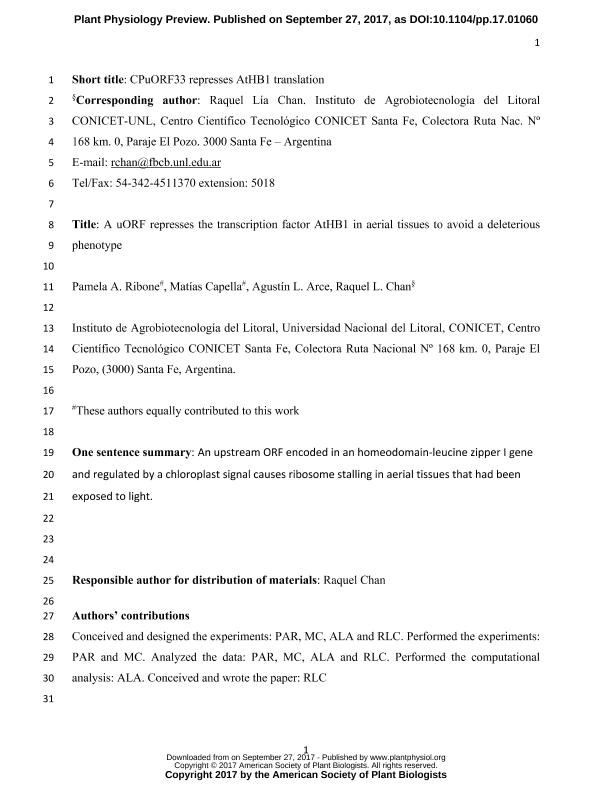Mostrar el registro sencillo del ítem
dc.contributor.author
Ribone, Pamela Anahí

dc.contributor.author
Capella, Matias

dc.contributor.author
Arce, Agustín Lucas

dc.contributor.author
Chan, Raquel Lia

dc.date.available
2018-05-16T20:14:25Z
dc.date.issued
2017-09
dc.identifier.citation
Ribone, Pamela Anahí; Capella, Matias; Arce, Agustín Lucas; Chan, Raquel Lia; A uORF represses the transcription factor AtHB1 in aerial tissues to avoid a deleterious phenotype; American Society of Plant Biologist; Plant Physiology; 175; 3; 9-2017; 1238-1253
dc.identifier.issn
0032-0889
dc.identifier.uri
http://hdl.handle.net/11336/45429
dc.description.abstract
AtHB1 is an Arabidopsis (Arabidopsis thaliana) homeodomain-leucine zipper transcription factor that participates in hypocotyl elongation under short-day conditions. Here, we show that its expression is posttranscriptionally regulated by an upstream open reading frame (uORF) located in its 5' untranslated region. This uORF encodes a highly conserved peptide (CPuORF) that is present in varied monocot and dicot species. The Arabidopsis uORF and its maize (Zea mays) homolog repressed the translation of the main open reading frame in cis, independent of the sequence of the latter. Published ribosome footprinting results and the analysis of a frame-shifted uORF, in which the repression capability was lost, indicated that the uORF causes ribosome stalling. The regulation exerted by the CPuORF was tissue specific and did not act in the absence of light. Moreover, a photosynthetic signal is needed for the CPuORF action, since plants with uncoupled chloroplasts did not show uORF-dependent repression. Plants transformed with the native AtHB1 promoter driving AtHB1 expression did not show differential phenotypes, whereas those transformed with a construct in which the uORF was mutated exhibited serrated leaves, compact rosettes, and, most significantly, short nondehiscent anthers and siliques containing fewer or no seeds. Thus, we propose that the uncontrolled expression of AtHB1 is deleterious for the plant and, hence, finely repressed by a translational mechanism.
dc.format
application/pdf
dc.language.iso
eng
dc.publisher
American Society of Plant Biologist

dc.rights
info:eu-repo/semantics/openAccess
dc.rights.uri
https://creativecommons.org/licenses/by-nc-sa/2.5/ar/
dc.subject
Hd-Zip
dc.subject
Uorf
dc.subject
Cpuorf33
dc.subject
Expresión Génica
dc.subject.classification
Otras Ciencias Biológicas

dc.subject.classification
Ciencias Biológicas

dc.subject.classification
CIENCIAS NATURALES Y EXACTAS

dc.title
A uORF represses the transcription factor AtHB1 in aerial tissues to avoid a deleterious phenotype
dc.type
info:eu-repo/semantics/article
dc.type
info:ar-repo/semantics/artículo
dc.type
info:eu-repo/semantics/publishedVersion
dc.date.updated
2018-05-11T21:17:58Z
dc.journal.volume
175
dc.journal.number
3
dc.journal.pagination
1238-1253
dc.journal.pais
Estados Unidos

dc.journal.ciudad
Rockville
dc.description.fil
Fil: Ribone, Pamela Anahí. Consejo Nacional de Investigaciones Científicas y Técnicas. Centro Científico Tecnológico Conicet - Santa Fe. Instituto de Agrobiotecnología del Litoral. Universidad Nacional del Litoral. Instituto de Agrobiotecnología del Litoral; Argentina
dc.description.fil
Fil: Capella, Matias. Consejo Nacional de Investigaciones Científicas y Técnicas. Centro Científico Tecnológico Conicet - Santa Fe. Instituto de Agrobiotecnología del Litoral. Universidad Nacional del Litoral. Instituto de Agrobiotecnología del Litoral; Argentina
dc.description.fil
Fil: Arce, Agustín Lucas. Consejo Nacional de Investigaciones Científicas y Técnicas. Centro Científico Tecnológico Conicet - Santa Fe. Instituto de Agrobiotecnología del Litoral. Universidad Nacional del Litoral. Instituto de Agrobiotecnología del Litoral; Argentina
dc.description.fil
Fil: Chan, Raquel Lia. Consejo Nacional de Investigaciones Científicas y Técnicas. Centro Científico Tecnológico Conicet - Santa Fe. Instituto de Agrobiotecnología del Litoral. Universidad Nacional del Litoral. Instituto de Agrobiotecnología del Litoral; Argentina
dc.journal.title
Plant Physiology

dc.relation.alternativeid
info:eu-repo/semantics/altIdentifier/doi/http://dx.doi.org/10.1104/pp.17.01060
dc.relation.alternativeid
info:eu-repo/semantics/altIdentifier/url/http://www.plantphysiol.org/content/175/3/1238
Archivos asociados
